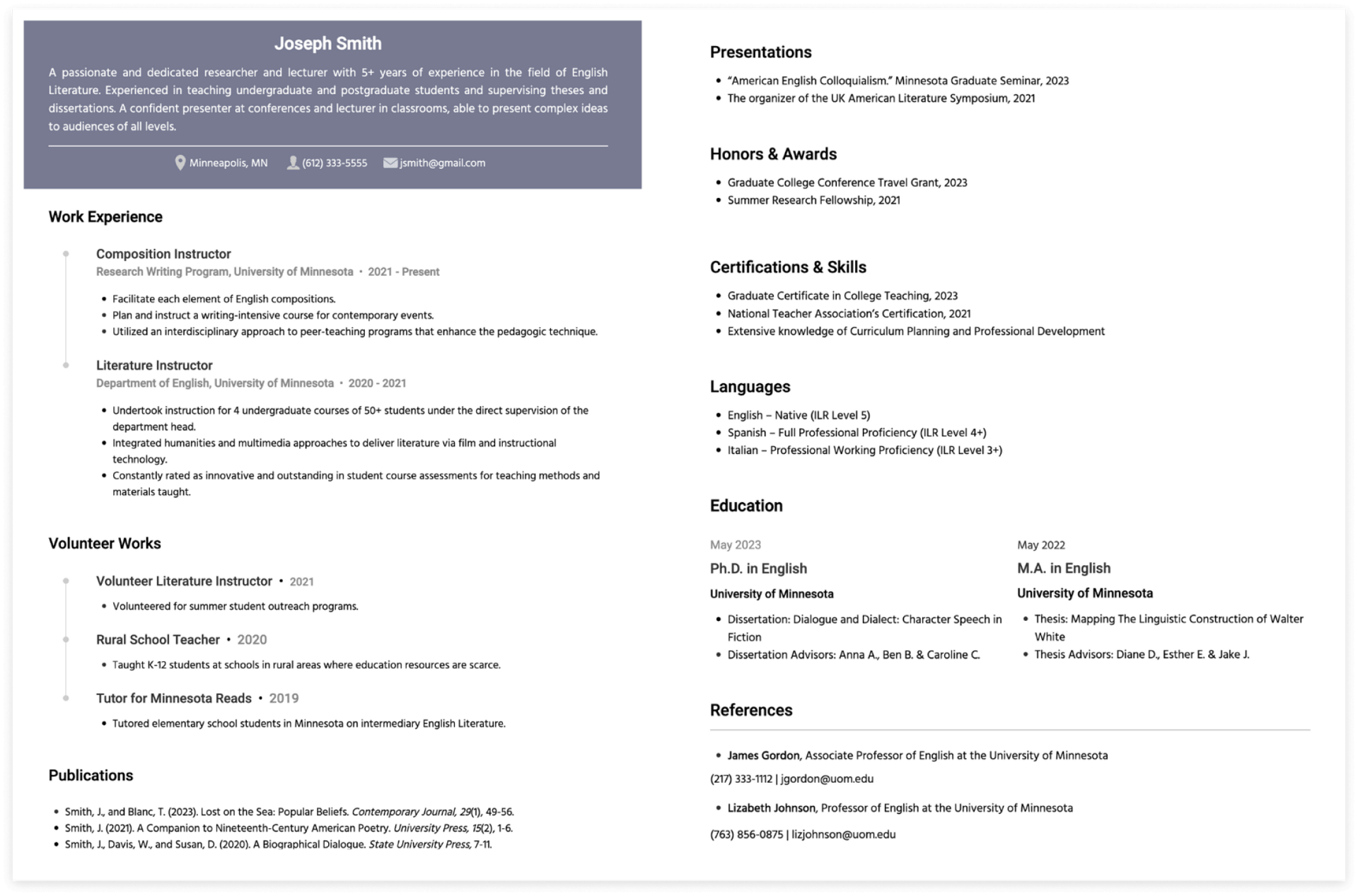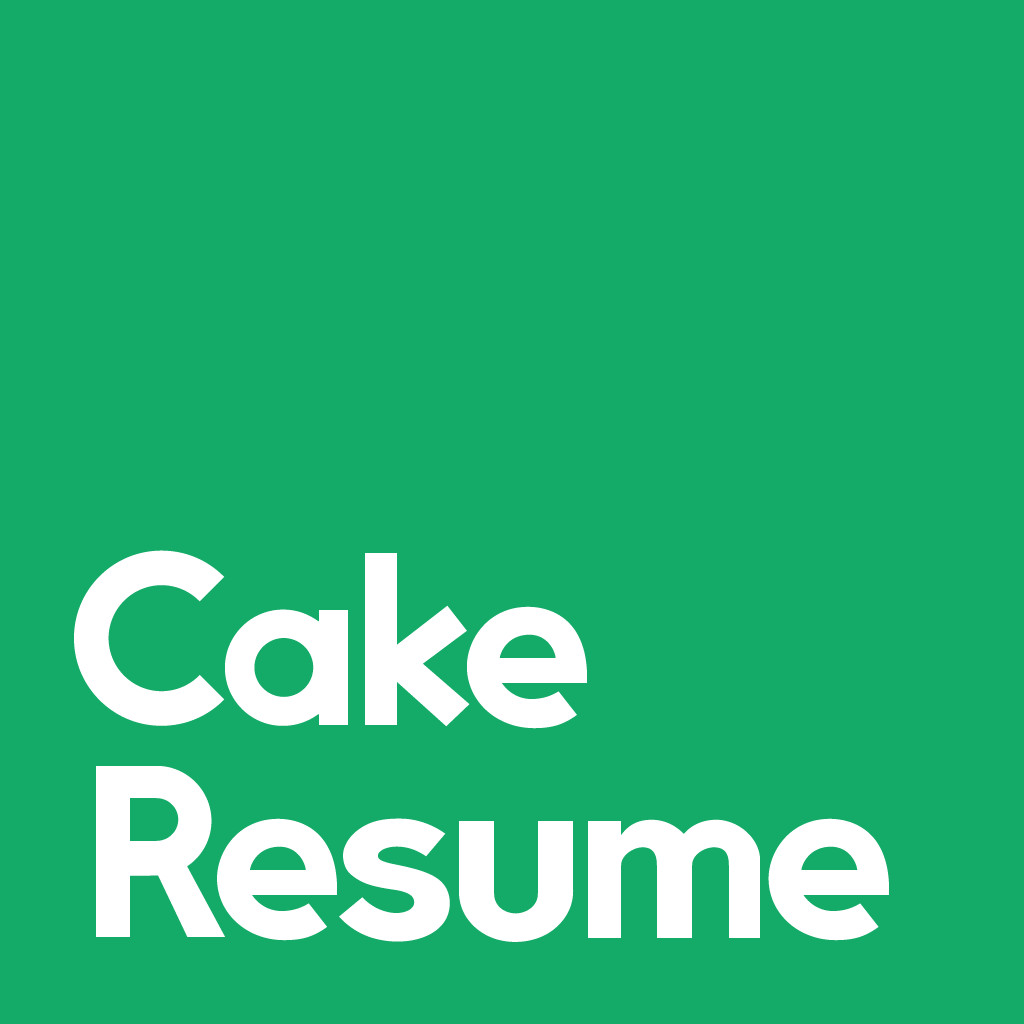Academic CV 2023 Writing Guideline (+Template, Example, and Tips)

One of the indispensable factors in a successful academic application process is a well-written academic curriculum vitae (CV). A well-structured and written CV can help showcase one achievement. It might sound like a daunting task, but in this article, you will learn everything about an academic CV: from how long it should be, what to include, to practical tips and best CV templates.
Let's dive right in!
TABLE OF CONTENTS
What Is an Academic CV?
An academic CV is a comprehensive document that highlights your educational background, research and teaching experience, publications, grants, fellowships, awards, and other achievements.
An academic CV is most often used by researchers and scholars when applying for education, scientific, or research positions and academic programs. In general, there are three scenarios when an academic CV would be required:
Applying for postgraduate programs
When undergraduates apply for postgraduate programs, an academic CV usually is part of the application requirement. Instead of submitting a short CV, an academic CV is required for Master's and Ph.D. applications, as institutions usually go through a stricter selection process when admitting candidates to their postgraduate schools.
Applying for grants or scholarships
Undergraduate and graduate students may also use academic CVs to apply for grants or scholarships. This is because, in comparison to a short CV, academic CVs provide more extensive information about a grand/scholarship candidate’s achievements & performance.
Applying for academic and research jobs
When applying for a position in a college, university, or a research institution, a professional would prefer using an academic CV over a resume to show his or her qualifications. CVs allow scholars and researchers to include educational credentials such as publications, research, and conferences they’ve done, which could take a few pages to list out all the information.
📚 Further reading: What Is A CV? [Definition, Element, Writing Tips, and Examples]
How to Write an Academic CV
Here is a general format of the order of things to include in an academic CV, with examples for each element. The order could be changed depending on the relevance and significance of the achievement to the role you are applying for. Every item below is put in the reverse chronological resume order.
Contact details
The contact details section should be the most visible part of your CV to make it easier for readers to reach out to you. Consider placing it on top of your CV or under the CV objective/summary section. In this section, include your:
- Full name (make sure it is the largest font on your CV)
- Location
- Phone number
- Email (use a professional address such as [email protected])
Here’s an example:
Jane Doe
Springfield, IL
(123) 456-7890 | [email protected]
Research objective or CV summary
In this section, you want to briefly summarize your key accomplishments to show your suitability for the position applied. You could also mention the position you are applying for and the value you can bring with the skills and experience you have.
Example of a researcher's curriculum vitae objective:
“A recent graduate from the [university name] with expertise in [field of study]. [Briefly explain key achievements such as notable awards, publications, or working experience]. Seeking to utilize knowledge gained through my research on [research topic] to perform postgraduate research into [future research topic].”
Education
List your most significant academic backgrounds in reverse chronological order, including the undergraduate and graduate degrees you earned. For each degree, list the degree name, majors/minors, institution, date of graduation, and any relevant details. If applicable, include your dissertation or thesis title and your advisors’ names.
Example of a Ph.D. student curriculum vitae education section:
EDUCATION
- University of Michigan
Ph.D. in Psychology | May 2022
- Dissertation: Mapping the criminal mind: Profiling and its limitations.
- Dissertation Advisors: John A., Steven B., Bill C.
- University of Chicago
M.A. in Psychology | May 2019
- Thesis: Social Media Interface and Generation Z’s Cognitive Mapping
- Thesis Advisors: Charles A., Martin B., Kelly C.
- University of Wisconsin
B.A. in Psychology | May 2017
Relevant professional experience
List the teaching or research experience on your CV that showcases your skills and working expertise. You can further group experiences into categories such as research, teaching, and administration to enhance the organization of your academic CV.
For each position, include the job title, organization, location, dates, and bullet points that highlight your duties and accomplishments. Remember to list out the most recent or most important positions you’ve held to keep the CV relevant and concise.
Example of an academic resume experience section:
EXPERIENCE
- Instructor | 2020 - 2024
Princeton Academy, Department of English
Courses taught: College Writing I, College Writing II, 17th and 18th C. British Lit
- Teaching Assistant | 2018 - 2021
Stanford College, Department of General Business
Courses taught: Business Analytics I, Business Analytics II, Microeconomic
Publications
Include any publications such as books, articles, reviews, and other academic writings. If applicable, divide peer-reviewed and other publications into two sections. Add relevant details including the writer name (if multiple), article title, name of journal/magazine/book, date of publication, and page numbers (if applicable). Stay consistent with one bibliography style.
Example of an APA style curriculum vitae research publication:
PUBLICATION
Collins, G. & Krueger, K. (2019). Business Correspondence. The Business Journal, 14(3), 22-24.
💡 Pro Tip: If you have multiple publications to include, simply list each entry in bullet points.
Presentations or talks
Being invited to speak at an event requires deep knowledge and expertise in a certain field, which is not something that just anyone could do. If you have such experiences, make sure to list any presentations or speaking events that you have given or are invited to speak at in your academic CV.
Example of listing presentation experiences on an academic CV:
PRESENTATION
Doe, J. (2018). “Issues of Reinsurance.” Risk & Insurance Conference.
Honors and awards
Include any awards you have received that are relevant to the position you are applying for. They are great for academic CVs as they showcase your excellent performance in the field of your expertise.
Example of graduates CV award section:
HONORS & AWARDS
- Distinguished Scholar Award, 2025
- Teaching Fellow of the Year, 2024
- Academic Excellence Award, 2022
The elements listed from here below are optional. Depending on the role’s requirements, you can choose to add them to your academic CV in the order of importance.
Services
List any institutional service you have done in the past, such as supervising students, managing an office or department, or giving any other academic assistance. Teacher volunteers and other service activities that you did in relevance to your field of expertise can also be listed in this part of your academic CV.
Here’s an example:
SERVICES
Undergraduate Mentor | 2018 - 2022
Department of Peer Learning, Babson College
- Developed personalized education paths and connected peers to programs, opportunities, and resources on campus to actualize their academic interests.
Grants and/or scholarships
If you’ve received any grants or fellowships, it means that your research has been proved valuable enough to attract funding. You can also combine this section with the honors/awards section in your academic CV to make it look more organized.
Include the title of the grant, name of the funding institution or agency, date received, and/or name or purpose of the research project. Generally, it is more common for business and scientific CVs to include the exact amount of funding.
Here’s an example of how you want to list it on your academic CV:
GRANTS
- Innovative Design Grant (Artificial Intelligence Agency, 2008), $10,000
Certifications and/or skills
List all relevant certifications with their names and date received. Briefly mention any strengths or skills that are relevant to the job but are not suitable to be included in any other sections of your academic CV.
Here’s an example:
CERTIFICATIONS
- Graduate Certificate in College Teaching, Georgia College, 2009
- Programming ability in C, C++, and Java
- Extensive knowledge of SAS and SPSS
Languages
Include the languages you know in an academic context and the level of proficiency for each language. However, it’s not necessary to include languages with lower levels of reading proficiency.
Indicate your level of proficiency accurately by applying one of the effective frameworks such as LinkedIn, ILR, CEFR, or ACTFL. Or highlight the specific skills (reading, writing, speaking, listening) that you have confidence in.
Here’s an example:
LANGUAGES
- English – Native/Bilingual (ILR Level 5)
- Mandarin – Full Professional Proficiency (ILR Level 4+)
Professional associations
List the relevant professional organizations that you are a member of, whether it is national, regional, state, or local. Include the title of any position you’ve held on the board. Student memberships are also appropriate to be included in the academic CV.
Example of listing associations on an academic CV:
ASSOCIATIONS
- American Psychology Association (APA)
- Maryland Psychology Association (MPA)
Current and/or recent research topics
This section could be added to a dedicated research experience section if you have one. Include the title, description, and date of the research projects that you’ve conducted or are in progress.
Here’s how you want to include your research in your academic CV:
RESEARCH EXPERIENCE
- Clean Bioenergy Resources, 2010
Conducted research on the possible biomass resources in the United States and indicated various applications achievable in the near future.
Volunteer work
Include any volunteer work or community services you’ve participated in, such as working with churches, shelters, institutions, non-profits, and other community organizations. Having community involvement demonstrates your willingness to go the extra mile and help out places in need, which is an important quality for educators and people in the academic field.
Here’s an example:
VOLUNTEER WORKS
- Volunteer NGO French Instructor, 2018
- Tutor, Institutions in Rural Areas, Cambodia, 2017
References
While it is optional, this could be the final section of your academic CV. Include 3-5 professional or academic references. List each referral’s name, title, mailing address, telephone number, and email address. Although it is unlikely that the mailing address will be used, following the traditional format would be the safer way to go.
Here’s an example:
REFERENCES
- Linda Song, Assistant Professor at Penn State University
123 Main St. Los Angeles, CA 90001
213-522-5333
[email protected]
- Austin Lee, Head of Human Resources at NGO
123 Main St. Los Angeles, CA 90001
213-511-5222
[email protected]
7 Tips for Writing an Academic CV
Here are some tips to keep in mind when composing an academic CV.
💡 Tailor your academic CV.
Some positions or programs may emphasize research or teaching experiences, while others may value publications more.
You need to target your academic CV to the position or program you are applying for. This will require you to research what the organization or institution values most from their candidates.
A curriculum vitae in research may focus differently from a scientific CV. Showing relevant skills and experiences will greatly increase your chances to be considered for the position.
💡 Pay attention to academic CV formatting.
Choose reasonable and effective CV formatting, and keep it consistent and easy to read. Use 1-inch margins on all sides of your academic CV to look good when printed out.
Serif fonts are easier to read in print, while sans-serif fonts are clearer when viewed digitally. Times New Roman would be a safe choice if you aren’t sure which to choose.
Arrange your font sizes and styles to highlight the titles and subtitles while showing the difference. For instance, use ALL CAPS or boldface to make your headings stand out and separate sections. You could also add double-blank lines before all headings to guide readers to the important parts.
💡 Be consistent and accurate when citing publications.
Stick your publications to one bibliography style (i.e. MLA, APA). Don’t switch styles as it will confuse the reader on the elements and authenticity of each publication.
💡 Avoid using technical jargon.
It is recommended to ensure that the readers could quickly read and understand your qualifications. Avoid technical jargon and abbreviations or unclear wording, and keep your academic CV concise when describing any necessary information.
💡 Add a footer and put down page numbers and your name there.
In case the pages get separated, or for quicker reference, it is advised to include a footer on each page with page numbers and your last name. This is especially important if you are submitting a printed copy of your academic CV.
💡 Save your academic CV in PDF format.
PDF is the most commonly used file format when it comes to transferring documents online. It keeps your formatting intact so you don’t have to make further alterations. If you try to transfer a Word document to a Google Doc, the formatting might get messed up. However, do make sure you are following the application requirements, as sometimes the recruiter/hirer might have different requests.
💡 Ask someone in your field to review your CV.
Have someone review and proofread your academic CV. It could be an advisor or mentor in your field, or someone who worked/is working in the organization you are applying to. This person should have a better understanding of the expectations of the position and could give you advice on how to better format or choose the right content to tailor your academic CV.
Best Tools Recommended to Create an Academic CV
There are many CV builder tools that provide academic CV template. These tools are sometimes known as resume builders. You can utilize these tools to build an academic CV online for free. Here is an evaluation of the pros and cons of some common tools:
CakeResume
Pros:
- Easy and quick to create CVs with drag-and-drop tools.
- Link multiple curriculum vitae, resume, and portfolio under one profile.
- Can be updated even after being submitted when shared as a link.
Cons:
- Need to create an account to start building your academic CV.
- Limited options on editing the margin.
MS Word
Pros:
- Many academic CV word templates to choose from.
- Versatile formatting that’s popular among both employers and job seekers.
- Simplistic designs work better for ATS scanning.
Cons:
- Need subscription to Microsoft Office.
- Need to transfer to PDF file to avoid receivers altering or copying information directly.
- May encounter skewed formatting if opened on an incompatible device.
Google Docs
Pros:
- Numerous free templates are available for different resume/CV purposes.
- Can be viewed online anywhere without signing in to a Google account.
- Better link security with options to choose who has access to view, edit, or comment.
Cons:
- Need a Gmail account to create Google Docs.
- It is possible to get viruses from the links.
- Require an Internet connection.
Academic CV Example
For your reference, here is a researcher curriculum vitae example:
Joseph Smith
Minneapolis, MN
(612) 333-5555
[email protected]
A passionate and dedicated researcher and lecturer with 5+ years of experience in the field of English Literature. Experienced in teaching undergraduate and postgraduate students and supervising theses and dissertations. A confident presenter at conferences and lecturer in classrooms, able to present complex ideas to audiences of all levels.
EDUCATION
- Ph.D. in English
University of Minnesota | May 2023
Dissertation: Dialogue and Dialect: Character Speech in Fiction
Dissertation Advisors: Anna A., Ben B. & Caroline C.
- M.A. in English
University of Minnesota | May 2022
Thesis: Mapping The Linguistic Construction of Walter White
Thesis Advisors: Diane D., Esther E. & Jake J.
EXPERIENCE
- Composition Instructor, Research Writing Program
University of Minnesota | 2021 - present- Facilitate each element of English compositions.
- Plan and instruct a writing-intensive course for contemporary events.
- Utilized an interdisciplinary approach to peer-teaching programs that enhance the pedagogic technique.
- Literature Instructor, Department of English
University of Minnesota | 2020 - 2021- Undertook instruction for 4 undergraduate courses of 50+ students under the direct supervision of the department head.
- Integrated humanities and multimedia approaches to deliver literature via film and instructional technology.
- Constantly rated as innovative and outstanding in student course assessments for teaching methods and materials taught.
PUBLICATIONS
- Smith, J., and Blanc, T. (2023). Lost on the Sea: Popular Beliefs. Contemporary Journal, 29(1), 49-56.
- Smith, J. (2021). A Companion to Nineteenth-Century American Poetry. University Press, 15(2), 1-6.
- Smith, J., Davis, W., and Susan, D. (2020). A Biographical Dialogue. State University Press, 7-11.
PRESENTATIONS
- “American English Colloquialism.” Minnesota Graduate Seminar, 2023
- The organizer of the UK American Literature Symposium, 2021
HONORS & AWARDS
- Graduate College Conference Travel Grant, 2023
- Summer Research Fellowship, 2021
CERTIFICATIONS & SKILLS
- Graduate Certificate in College Teaching, 2023
- National Teacher Association’s Certification, 2021
- Extensive knowledge of Curriculum Planning and Professional Development
LANGUAGES
- English – Native (ILR Level 5)
- Spanish – Full Professional Proficiency (ILR Level 4+)
- Italian – Professional Working Proficiency (ILR Level 3+)
VOLUNTEER WORKS
- Volunteer Literature Instructor, 2021
- Volunteered for summer student outreach programs.
- Rural School Teacher, 2020
- Taught K-12 students at schools in rural areas where education resources are scarce.
- Tutor for Minnesota Reads, 2019
- Tutored elementary school students in Minnesota on intermediary English Literature
REFERENCES
- James Gordon, Associate Professor at University of Minnesota
11827 Champlin Dr #202 Champlin, Minnesota(MN)
(217) 333-1112
[email protected]
- Lizabeth Johnson, Professor at University of Minnesota
11840 261st Ave Zimmerman, Minnesota(MN)
(763) 856-0875
[email protected]
CakeResume is the best resume builder that provides the best CV making tools and free templates. Take your career to a new heights, create a CV online now!
--- Originally written by Sandy Tuo ---

With the intention of helping job seekers to fully display their value, CakeResume creates an accessible free resume/CV/biodata builder, for users to build highly-customized resumes. Having a compelling resume is just like a piece of cake!







